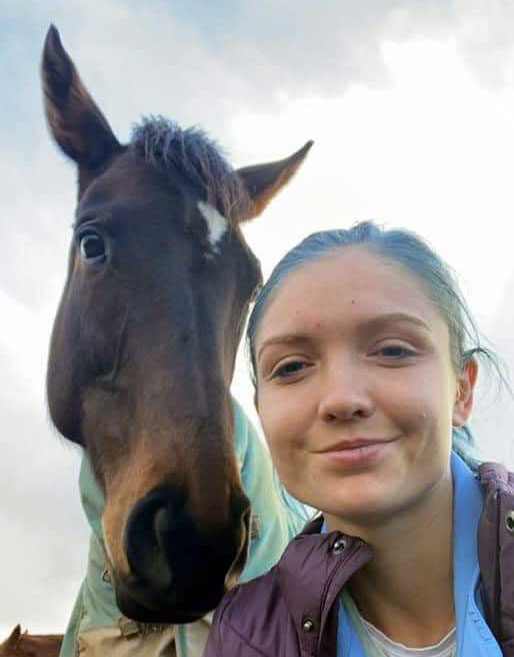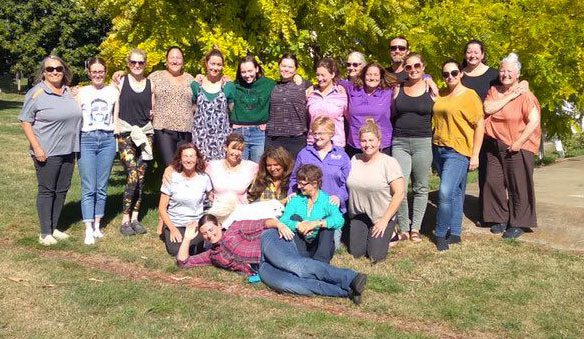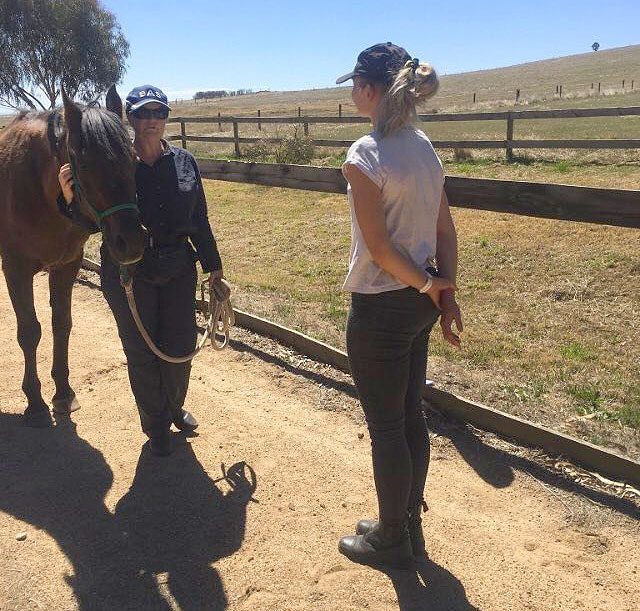
When did you do your training with EPI?
I trained in February Block 2021
We haven’t trained many students in their 20s, so you’re one of the youngest students we’ve trained. What was that was like, for you being one of the youngest in the group and also what was the training content like, from your perspective?
The training group was so amazing and we had such a variety of ages and it kind of helped me because I saw that we were from all walks of life and different backgrounds. So it helped me realise that I can do this, anyone can do this if they really put their mind to it
I suppose to me, being so young and doing the mindfulness and awareness work has actually opened me up to a better work lie balance. I noticed while I was doing the training that I wasn’t stressed about work like I usually am – because I’m usually so go, go go and have all this energy. The training really slowed me down and made me more present. That and learning from the other students – being around so many people on the same wavelength but also learning from their experience. I think having such an amazing group of students around me supported me to just lean into the challenge of the training and everything that came along with it. Because it was challenging – I shared things I’ve never actually spoken about before and there was no judgement. The opportunity to just explore and express our emotions and for it to be ok – it was life changing. But on the age thing – rather than thinking I was too young and this was too much I thought, Wow what an opportunity to have so much support.

How did you find the EPI Training and decide to enrol?
I had actually been researching training for quite a while. My employer, House on the Hill Paediatric Occupational Therapy got a small business grant and they supported me to enrol with EPI – it was such great timing. One of the reasons my boss took me on at HOTH is because of my interest in alternate therapies and I had always been interested in equine therapy. I let them know right from the start that’s where I wanted to go. I knew about hippotherapy because that’s what I had heard about and then I enquired with the Institute. I had a phone call with Meg and she spoke about how the horses are included in her work and the whole approach of the EPI Model and I thought it sounded like a challenge but an interesting one!
So, you kind of touched how you had the support of your employer – was there anything specific you did to get them on board?
I don’t think it was anything specifically in my awareness other than being really open about my passion and what I wanted to do. I think they saw that passion and I really believe that with the right people around you – they want to support you and see you succeed. So I think it was the combination of my passion and being really clear about what I wanted and where I was headed and then sharing that with my employer who could support me, who are really human centred and whose trust I had earned over time. So I think that combined with my hard work and passion drove it.
What would you say was your experience of training with EPI as a whole. What did you find challenging? What did you find supportive?
I think the biggest challenge for me was to be open to practising awareness. I was never really comfortable with being made aware of my feelings. Because in my family, emotions weren’t ok so the challenging part was not only leaning into that discomfort but also with people I didn’t know. At the same time, it would have been harder if they were people I did know! But it was all really new for me, being open, sharing so much myself and my story. SO that was a huge challenge, just constantly leaning into that and staying open to the experience.
And then the amazing support and non judgement from everyone in the training – that was just incredible! And as I shared the parts that were hard for me, everyone else had theirs too and they were sharing them. It made me feel like I was really a part of something. It really changed things for me!
Has that helped you in your work with children?
Yeah. So many people are frightened of my children’s emotions because it’s like they are needing to label or waiting for something to happen. So everyone has this sense of tension in their body, like I did before I did the training. But now, I’m able to better support the clients and also their parents to know that the emotions are ok and we can be comfortable with them. Even the ones we don’t like. Its really changed some of the relationships between parents and children because they understand each other a little more now.

You’ve not only trained with the Institute, you’re also practising, which is a leap a lot of students find difficult. Did you encounter any challenged in moving from a student to practicing?
One of my clients really inspired me as I was studying. I think I’d been back at work for two weeks after training and I was telling him about it and he loves horses and he was so excited. So that really motivated me.
I had been working on everything in the background as I was studying and then I had a meeting with my employer to talk about training and instead of doing that I presented them with a Business Plan! I think that was a bit surprising for everyone but I was so motivated and I was able to show the financials and other aspects of the business. It wasn’t final and we had to adapt it quite a lot as we’ve figured things out but it was a starting point so we just started there. I also of course had Mandy (of EQ Haven) from the training and her support and so her, my employer and me all just really connected and decided to work together.
I think if I didn’t build those connections it would have been much more difficult to get things off the ground so I would say building connections even before you train and in your training is so important, not just for this work but for anything you want to do.
You have moved straight into developing a model to present to your MHOT agency to integrate EAP into your work, how did you do that?
I moved straight into a model of EAP relatively quickly, as I had been spending time just brainstorming with myself and different people on how it would work with my current role. For example, I see children on a fortnightly and weekly basis most commonly during term time. During The holidays, my role changes, as I have more control over what I do, as long asI continue to bill my hours per day. This means I can halt all usual term time appointments during holidays, and focus on intensive OT programs or other interests. This is where I saw the trial programs fitting in. These times of the year are my most flexible, and many parents understand that I will be unavailable during this time anyway, so what a perfect spot to throw in some preliminary and trial EAP programs. I also was able to do this by creating a business plan and helping me to problem solve all the areas I didn’t have covered. I am lucky, my current workplace is supportive and open to trying new ways of intervention, even if they aren’t fully evidence-based yet. Plus my passion is what got them over the line – if I didn’t chase it, it wouldn’t have happened. I had to make it happen.
What are some of the changes happening for your clients, since you have integrated your EPI work into your MHOT, and since you have started your EAP?
My clients have had some huge changes in their understanding and awareness of emotions and how they feel in their body. My clients have also experienced a greater sense of ‘grounding’ and regulation, and feel more connected in their relationships. My clients have learnt ways to transfer their skills learnt from EAP faster than with room-based setting strategies, i.e. one particular client always thinks ‘What would Katie (one of our horses) do’ in a challenging situation. My clients have experienced a greater connection with themselves, control over their nervous system, and a generally more calm and flexible self. Some of them are even starting to reflect on their behaviours during social situations that have been challenging and attempting to learn from them. Many are finding emotional support from horses. Many have improved their ability to stay focused and present on what is right in front of them, the here and now.
You moved straight into evaluating your EAP work, to track your effectiveness and client changes and improvements as a result of practicing EAP – what did you get to prepare, do, develop and action to do this?
As an OT, I am constantly evaluating and recording effectiveness of practice through various types of standardised and non-standardised measures, as it is a part of the work we do in association with the NDIS. The NDIS provides greater funding and cooperation with professionals who track progress with quantitative figures and standardised measures. Therefore, preparing and doing this was not something out of the ordinary, as I had done it many times before. However, the measures I’ve incorporated are something that are not a part of my ‘ standard test battery ‘ to measure effectiveness. The Vinelands-3 and DASS-42 were selected by me and my supervisor as they targeted all of the areas I believed that the Horse Wisdom Program would address in children, i.e. maladaptive behaviours, internalising and externalising behaviour, daily living skills, social skills, depression, anxiety and stress. On top of this, we also created a little feedback form with direct questions about what people liked, didn’t like, what we could improve on, and if they would access ongoing EAP sessions, and if so, how often. My OT supervisor and practice manager, Sammi, helped me with brainstorming discussions, and I also spent some time researching which assessments would be more recognised by the NDIS for outcomes. The Vinelands-3 fits into their categories because it is a functional capacity assessment and can be performed by an OT or Psych. It was a bit of work, but something I was already familiar with.
Some testimonials/quotes:
1. “Katie is the greatest teacher. Some days she has big boundaries, other days she has little boundaries, and it depends on the weather, how she feels and who she’s with.”
2. “I feel like I have a really good relationship with Kya, she doesn’t push me.”
3. “I really enjoyed this and I want to come back. Please put me on the list for the next program. I want to see if Daisy remembers me, and my challenge today was knowing I might not come back.”
4. “When Daisy came down the hill after I called her name, it was one of the most amazing moments I’ve ever experienced.”
5. “The horses are just themselves. They don’t pretend, and they just tell it like it is.”
6. “The horses have taught me that no matter how high or far you set your goal, you can always revise it to make it more achievable.”
7. “The horses don’t hold onto grudges like we do, they let their feelings go and move on. I’ve learnt how to be with my feelings”
8. “If a lot of little events caused her behaviour, then a lot of little, present moments can help her.”
I definitely recommend the training, the challenge and the journey to anyone thinking about it. It has been life changing.
